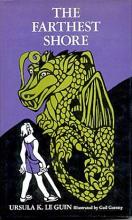Ursula Le Guin - The Farthest Shore

The Wizard of Earthsea series is heavily influenced by nonwestern philosophy, so I wasn't expecting to see an existentialist novel by Le Guin. I enjoyed it.
The antagonist in this novel is the unwillingness of people to accept death. This also causes them to lose their passions in life: "To refuse death is to refuse life... You will die. You will not live forever. Nor will any man nor anything. Nothing is immortal. But only to us is it given to know that we must die. And that is a great gift: the gift of selfhood. For we have only what we know we must lose, what we are willing to lose... Would you give up the craft of your hands, and the passion of your heart, and the light of sunrise and sunset, to buy safety for yourself -- safety forever?"
When the archmage is asked why he is unaffected by the malaise going over the world, he responds that wants to do what he is doing: "Because I desire nothing beyond my art... And if I am soon to lose it, I shall make the best of it while it lasts." In the book, his art represents all of the meaningful crafts and endeavors that people engage in and that make people happy. Desiring nothing beyond his art evokes Camus' "Myth of Sisyphus" for me -- that even though Sisyphus is only pushing a rock up a hill, we should still imagine Sisyphus happy. And making the best of his art while it lasts is a tight fitting analogy for making the most of a life that will end too soon.
He also accepts death: "Did you not understand that he, even he, is but a shadow and a name? His death did not diminish life"



